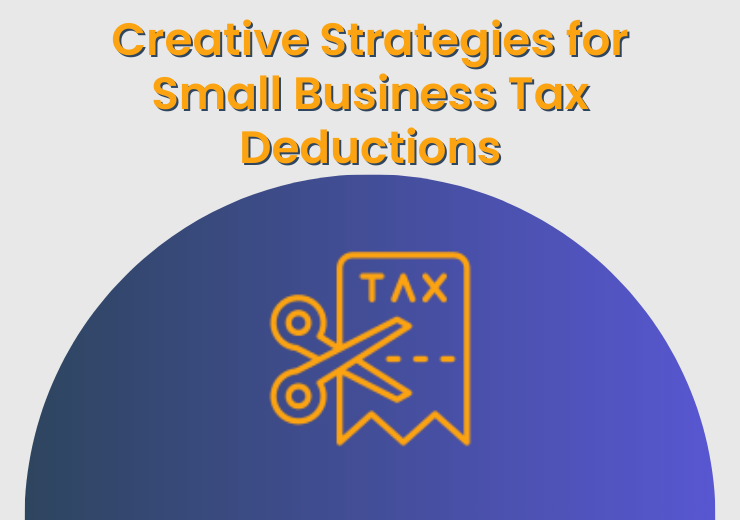Running a small business comes with its share of challenges, not the least of which is managing finances effectively. One area where savvy business owners can significantly benefit is through strategic tax planning. By understanding and implementing creative strategies for small business tax deductions, entrepreneurs can minimize their tax burden and keep more of their hard-earned money. In this guide, we’ll explore some innovative approaches to maximizing tax deductions for small businesses.
Understanding Tax Deductions
What are Tax Deductions?
Tax deductions are expenses that businesses can subtract from their taxable income, ultimately lowering the amount of taxes owed to the government. These deductions can include a wide range of business-related expenses, from office supplies to advertising costs.
Importance of Tax Deductions for Small Businesses
For small businesses, every dollar saved on taxes can make a significant difference in the bottom line. By taking advantage of available tax deductions, entrepreneurs can reinvest those savings back into their businesses, fueling growth and expansion.
Creative Strategies for Maximizing Small Business Tax Deductions
Leveraging Business Expenses
One of the simplest yet most effective ways to maximize tax deductions is by leveraging business expenses. This includes everything from office rent and utilities to marketing and advertising costs. By keeping detailed records and documenting all business-related expenses, entrepreneurs can ensure they’re not leaving any deductions on the table.
Taking Advantage of Home Office Deductions
With the rise of remote work, many small business owners operate out of home offices. Fortunately, the IRS allows entrepreneurs to deduct a portion of their home expenses, such as mortgage interest, property taxes, and utilities, based on the square footage of their home office. This can result in significant tax savings for those who qualify.
Utilizing Retirement Contributions
Contributing to retirement accounts not only helps entrepreneurs save for the future but can also provide immediate tax benefits. Small business owners can deduct contributions made to retirement plans such as SEP-IRAs, SIMPLE IRAs, and solo 401(k)s, reducing their taxable income for the year.
Exploring Health Care Deductions
Healthcare costs can be a significant expense for small businesses. Fortunately, the IRS allows self-employed individuals to deduct a portion of their health insurance premiums, as well as out-of-pocket medical expenses, including co-pays and prescription drugs. By exploring available healthcare deductions, entrepreneurs can save money on both taxes and health care costs.
Investing in Education and Training
Continuing education and professional development are essential for staying competitive in today’s business landscape. Fortunately, many education-related expenses are tax-deductible for small business owners. This includes tuition for courses, seminars, workshops, and conferences related to their industry.
Keeping Meticulous Records
Importance of Record-keeping for Tax Deductions
Effective record-keeping is crucial for maximizing tax deductions and avoiding potential audits. By maintaining detailed records of all business-related expenses, including receipts, invoices, and bank statements, entrepreneurs can substantiate their deductions and ensure compliance with IRS regulations.
Tools and Tips for Effective Record-keeping
With advancements in technology, keeping meticulous records has never been easier. There are numerous accounting software programs and mobile apps available that can streamline the record-keeping process for small business owners. Additionally, organizing receipts and documents in digital format can help save time and reduce clutter.
Seek Professional Guidance
Hiring a Tax Professional
Navigating the complex world of small business taxes can be overwhelming for entrepreneurs. That’s why many business owners choose to enlist the help of a qualified tax professional. A knowledgeable tax advisor can provide valuable guidance on maximizing deductions, minimizing liabilities, and staying compliant with tax laws.
Utilizing Accounting Software
In addition to professional guidance, utilizing accounting software can simplify tax preparation and record-keeping for small business owners. Many software programs offer features such as expense tracking, income reporting, and tax filing assistance, making it easier to manage finances year-round.
Conclusion
Maximizing tax deductions is essential for small business owners looking to minimize their tax burden and maximize their profits. By leveraging creative strategies such as business expense deductions, home office deductions, retirement contributions, health care deductions, and education expenses, entrepreneurs can keep more of their hard-earned money in their pockets. Additionally, maintaining meticulous records and seeking professional guidance can help ensure compliance with tax laws and avoid potential penalties.
FAQs
-
Can all business expenses be deducted on taxes?
- While many business expenses are deductible, some may be subject to limitations or exclusions. It’s essential to consult with a tax professional to determine which expenses qualify for deductions.
-
What is the difference between a tax deduction and a tax credit?
- A tax deduction reduces taxable income, while a tax credit directly reduces the amount of tax owed. Both can result in savings for small business owners, but they operate differently within the tax code.
-
Are there any tax deductions specifically for small businesses?
- Yes, there are several tax deductions available exclusively to small businesses, including those related to business expenses, home office deductions, retirement contributions, and health care expenses.
-
Do I need to keep receipts for tax deductions?
- Yes, it’s essential to keep receipts and documentation for all business-related expenses that you plan to deduct from your taxes. These records serve as evidence in case of an audit by the IRS.
-
How can I ensure I’m maximizing my tax deductions as a small business owner?
- The best way to maximize tax deductions is to stay organized, keep meticulous records, and seek professional guidance from a qualified tax advisor or accountant.

